Prof. Yong Ge and the Pipa π Ensemble Electrify New York's Carnegie Hall
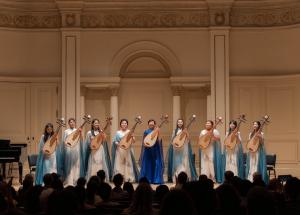
Pipa Unbound: Tradition and Beyond Professor Yong Ge and Students Recital, Weill Hall of Carnegie(Photoed by Jiaci Yan)
Professor Yong Ge, as a professor, doctoral supervisor, and committee member of the Academic Committee at the China Conservatory of Music, demonstrated masterful artistry throughout the performance. She is not only a renowned pipa virtuoso but also an inheritor of the legacy of the esteemed pipa master Dehai Liu. Her extensive experience and innovative interpretations were evident in every piece. Her numerous accolades, including “CCTV Top Ten Young Pipa Players” and “Beijing Youth Education Master,” underscore her exceptional talent and significant contributions to the field.
The concert opened with a stunning rendition of the ancient classic “Ambush from All Sides” (十面埋伏). Professor Yong Ge and the members of the Pipa π Ensemble—Xuanyu Xu, Yuemeng Li, Ruoshui Yang, Jiayi Wen, Yuqiao Wang, Wanxin Bai, Jiayu Qiu, and Xiaoqian Guo—perfectly recreated this representative martial suite with exquisite technique. This rendition, based on Dehai Liu’s performance score, vividly depicted the intense Battle of Gaixia. The Pipa π Ensemble is a practical music project at the China Conservatory of Music led by Professor Yong Ge, aimed at broadening the pipa instrument's capabilities in chamber and ensemble music.
The following programs presented numerous outstanding works, many of them U.S. premieres or world premieres, showcasing the pipa repertoire's continuous expansion. Jing Sun’s pipa quartet “Summer” (夏), based on Xinjiang folk music, was vibrant and dynamic. The world premiere of the ancient piece “Sai Shang Qu” (塞上曲), arranged by Weijie Gao in 2025 for pipa and string quartet, saw Professor Yong Ge’s pipa intertwining with the beautiful sounds of violinists Andy Didorenko and Ella Yeshuang Chen, violist Jay Julio, and cellist Xia Wu, deeply portraying Zhaojun Wang’s complex emotions before her journey to the frontier. Dehai Liu’s “Six Steeds of Zhaoling” (昭陵六骏) resonated with historical grandeur. Chen Tong’s “Moonlight” (月光) (2025 world premiere) offered a serene and contemplative experience. Si’ang Chen’s “Three Cantonese Tone Pictures” (广东音画三首) (2023) was composed for pipa ensemble, infusing traditional Cantonese melodies with new vitality. Additionally, Fandi Wang’s arrangement of the Xinjiang folk song “Grace Me a Rose” (送我一支玫瑰花), led by Professor Yong Ge and the Pipa π Ensemble members, collaborated with the Malhaar Ensemble’s sitar player Galen Passen and tabla player Pradeep Chatterjee, creating a cross-national, cross-cultural musical experience filled with exotic charm and vibrancy. Danhong Wang’s large-scale pipa concerto “Clouds and Flowers, Thoughts of You” (云想 花想), composed in 2013 and inspired by Bai Li’s poem Qing Ping Yue, featured Professor Yong Ge collaborating with Juilliard School pianist Yunqing Huang, their exquisite coordination perfectly blending Imperial Consort Yang(Yuhuan Yang)’s graceful elegance with the pipa’s lyrical beauty and martial expressiveness.
The concert culminated in powerful cross-cultural collaborations, further emphasizing the festival’s theme of global unity. Bin Zhang’s “Poem of the Earth” (大地之诗), making its U.S. premiere with the Celadon Stars World Orchestra and the Malhaar Ensemble, expressed profound gratitude for life, nature, love, and peace. Japanese composer Akira Mitake’s “Flowing Onwards” (川流不息), inspired by his experience as a survivor of US Airways Flight 1549 (the 2009 Hudson River landing incident), movingly conveyed a sense of resilience and appreciation for life’s continuous flow.
Prior to the performance, the Pipa π Ensemble was also invited to the United Nations Headquarters on July 16, where Professor Yong Ge engaged in a depth discussions with music enthusiasts among the UN staff. She introduced the pipa and performed classic works, astonishing the UN staff who expressed that they had never before heard the pipa capable of such a wide array of playing techniques, with such crisp sound and superb skill.
Following the concert, a Xinhua News Agency journalist in New York interviewed Professor Yong Ge. Professor Ge expressed, “The successful realization of this performance at Carnegie Hall would not have been possible without the collaborative efforts of artists and institutions from both China and the United States. We hope through the pipa, a Chinese instrument with profound historical roots, to showcase the unique charm and contemporary vitality of Chinese traditional music to the world. Furthermore, collaborations with different national orchestras represent a crucial step for pipa art to reach international audiences and engage in dialogue with world music.”
Touching on the future of Sino-US cultural exchange, Professor Yong Ge stated with confidence, “Music is a universal language that transcends linguistic and cultural barriers. Through such artistic exchange activities, we can not only help more American audiences understand and appreciate Chinese traditional music but also foster mutual understanding and friendship between the peoples of our two nations. Looking ahead, we anticipate that more outstanding young performers, like those nurtured by the China Conservatory of Music, will grace international stages, using music to tell Chinese stories and contribute to building a more harmonious and diverse world. We believe that through continuous cultural exchange, the hearts of the Chinese and American people will draw closer.”
This “Pipa Unbound: Tradition and Beyond” concert was a resounding success. Professor Yong Ge and the Pipa π Ensemble, with their exquisite artistry and spirit of open collaboration, not only showcased the rich heritage and contemporary evolution of the Chinese pipa but also powerfully conveyed the festival’s profound message of cross-cultural friendship and peace. It’s particularly noteworthy that many of these exceptional young pipa performers were trained at the China Conservatory of Music, and their brilliant performances on the international stage fully demonstrate the institution’s remarkable achievements and deep legacy in nurturing talent in traditional Chinese music.
Ms. Qianci Liu, Director of the New York Big Apple Music Festival, commented, "The Pipa π Ensemble, led by Professor Yong Ge, truly demonstrated the exquisite strength of Chinese folk music, which can only be described as having astonished the New York audience. We hope this music festival can serve as a bridge, welcoming even more folk music and world music groups to grace New York's stages." This concert brought the 6th New York Big Apple Music Festival to a perfect close. We look forward to more world music groups joining our festival, ready to shine brightly on the Lincoln Center stage in 2026!
Erin Young(Editor)
Paulus Hook Music Foundation LLC
+1 201-920-7112
paulushookmusicfoundation@gmail.com
Legal Disclaimer:
EIN Presswire provides this news content "as is" without warranty of any kind. We do not accept any responsibility or liability for the accuracy, content, images, videos, licenses, completeness, legality, or reliability of the information contained in this article. If you have any complaints or copyright issues related to this article, kindly contact the author above.
Small Modular Reactor Market Report 2025 – For Strategy Officers And Market Intelligence Teams
Ship Building Market Forecast to 2034 – For Business Leaders, Analysts, and Strategic Teams
Server Virtualization Software Market Analysis 2025 – Insights for Long-Term Investment & Planning
Więcej ważnych informacji
 Jedynka Newserii
Jedynka Newserii

 Jedynka Newserii
Jedynka Newserii

Polityka

Firmy dzierżawiące grunty od Skarbu Państwa muszą zwrócić majątek rolny. Zagrożony jest też wspierany przez nich ośrodek rehabilitacyjny
Działalność ośrodka rehabilitacji dla dzieci z niepełnosprawnościami w Głubczycach, w województwie opolskim, jest zagrożona, o czym alarmuje Stowarzyszenie „Tacy Sami”. Zagrożenie jest konsekwencją restrukturyzacji spółki Top Farms Głubczyce, która jest jednym z największych pracodawców w okolicy i od lat wspiera działalność stowarzyszenia. Rolnicza spółka nie wie, jakie będą dalsze losy dzierżawionych do tej pory przez nią ziem, które w listopadzie br. muszą wrócić do Zasobu Skarbu Państwa. Zarząd spółki od wielu miesięcy apeluje do Krajowego Ośrodka Wsparcia Rolnictwa o wiążące decyzje w sprawie powołania Ośrodków Produkcji Rolniczej, które miałyby powstać na zwróconych gruntach, oraz kryteriów wyboru ich nowych dzierżawców.
Bankowość
Polskie kredyty hipoteczne wciąż jednymi z najdroższych w Europie. Zdaniem członka RPP odgórne ograniczanie marż banków się nie sprawdzi

Hipoteki w Polsce, co podkreśla też wielu polityków, należą do najdroższych w Europie. To nie tylko kwestia wysokości stóp procentowych, ale też marży banku. Zdaniem członka RPP prof. Ireneusza Dąbrowskiego jest tylko możliwość wpływania na ten pierwszy czynnik, bo regulacyjne ograniczenie wysokości marży byłoby trudne do wdrożenia.
Ochrona środowiska
Budowa morskich farm wiatrowych w Polsce szansą na kilkadziesiąt tysięcy nowych miejsc pracy. Wciąż brakuje jednak wykwalifikowanych pracowników

W Krajowym Planie w dziedzinie Energii i Klimatu rząd przewiduje zainstalowanie do 2030 roku około 5,9 GW w morskich farmach wiatrowych i kolejnych 12 GW w ciągu następnej dekady. Offshore ma być istotnym filarem dekarbonizacji krajowej gospodarki. Realizowane przez polskie spółki wraz z partnerami zagranicznymi projekty tzw. fazy I nabierają tempa i wkraczają w etap budowy infrastruktury na lądzie. Wśród wyzwań, które czekają wykonawców, jest m.in. brak pracowników z branży offshore. Pomocne może być ściąganie do kraju Polaków, którzy pracują na zagranicznych projektach morskich.
Partner serwisu
Szkolenia

Akademia Newserii
Akademia Newserii to projekt, w ramach którego najlepsi polscy dziennikarze biznesowi, giełdowi oraz lifestylowi, a także szkoleniowcy z wieloletnim doświadczeniem dzielą się swoją wiedzą nt. pracy z mediami.
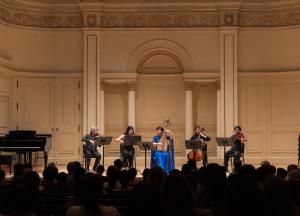
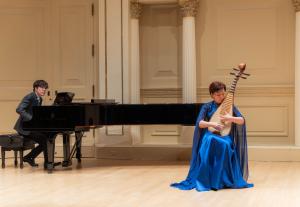
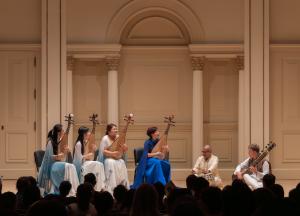
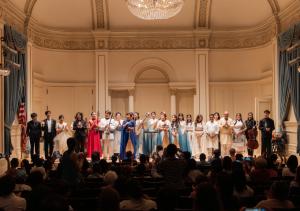

![Nestlé w Polsce podsumowuje wpływ na krajową gospodarkę. Firma wygenerowała 0,6 proc. polskiego PKB [DEPESZA]](https://www.newseria.pl/files/1097841585/fabryka-nesquik_1,w_85,r_png,_small.png)






.gif)

 |
| |
| |
|